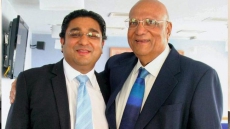LAHORE, Pakistan — Parveen Rafiq closed her hands around the neck of her youngest daughter, Zeenat, and squeezed and squeezed until the girl was almost dead.
Then, in the tiny apartment where the family lived, she doused the 18-year-old with kerosene and set her on fire.
Neighbours saw the smoke and rushed to the home. Someone inside, apparently one of Rafiq's daughters-in-law, was screaming, "Help her! Help!"
But the door was bolted from within. Moments later, they heard Rafiq scream from her rooftop: "I have killed my daughter. I have saved my honour. She will never shame me again."

Zeenat's crime was marrying a childhood friend she loved, defying her widowed mother's pressure for an arranged marriage and, in the mind of her mother and many of her neighbours, tarnishing her family's honour.
Her macabre death on June 8 in the eastern city of Lahore was the latest in a series of increasingly gruesome "honour killings" in Pakistan, a country with one of the highest rates of such killings in the world.
In one case, a mother slit the throat of her pregnant daughter who had married a man she loved. In yet another a jilted suitor doused a teenage girl with kerosene and set her on fire.
In the city of Abbottabad, a teenage girl was tortured, injected with poison and then strapped to the seat of a vehicle, doused with gasoline and set on fire. Her crime was helping a friend elope.
A jirga, or council of local elders, ordered her killing and dictated the manner of her death. The vehicle was parked in a public place, outside a bus stop as a message to others.

The brutality and rapid succession of killings horrified many Pakistanis. The numbers of such killings have climbed in lockstep with their sometimes-public spectacle. Last year, three people a day were killed in "honour" crimes in Pakistan: a total of 1,096 women and 88 men, according to the independent Human Rights Commission of Pakistan. In 2014, the number was 1,005 women, including 82 children, up from 869 women killed a year earlier. The true numbers are believed to be higher, with many cases going unreported, activists say.
Some human rights and women's rights activists believe honour killings have been inching up and showing greater brutality as the older generation tries to dig in against creeping change. Over the years, more women have been going to school and working outside the home, even among lower and lower middle class, and use of social media has helped women raise their voices.
"The old order of misogyny and extremism is falling apart, is really crumbling," says Marvi Sermid, a political commentator and women's rights activist. Conservative Muslim clerics are furious over the creeping change and are fighting back with regressive changes targeting women, she said.
The changes are a serious challenge to the status quo in Pakistan, where centuries of tradition and culture have tied the idea of a woman as a pristine and untouched commodity to a family's honour. Deeply conservative traditions have been further strengthened by decades of governments and military dictators who have often curried the support of religious hard-liners with legislation enshrining the old ways.

But more than 70 per cent of Pakistan's 180 million people are under 30, and among the younger, more tech-savvy generation, some are vocally challenging the traditions of their elders to an unprecedented degree.
Salman Akram Raja, a lawyer, said the young are pushing traditional boundaries even if the state is lagging behind and even if the conservative old guard is lashing back.
"I don't think this archaic order will win," Raja said. "But it is going to go down violently."

For months, neighbours said, Zeenat's mother had complained about her two elder daughters, who had married men of their own choice.
Zeenat was her last chance to save her honour. She planned an arranged marriage for Zeenat with a member of their own social caste, the Rajput, which traces its origin to the Indian subcontinent and is said to be descended from kings.
But Zeenat had her heart set on a young motorcycle mechanic named Hassan Khan.
They had met when she was 12 and he was 14 and quickly became playmates. They lived about two blocks apart in Changi Amar Sadhu, a crowded Lahore shantytown where electrical wires and phone lines crisscross overhead in a crazy jumble that obscures the sky. As they grew older, friendship became romance.
"We were in love," Khan said, his voice barely a whisper.
He fumbled through his phone until he found a collection of selfies that Zeenat had put together to the rhythm of their favourite song, an Urdu pop tune called "You Made Me Your Lover."
She loved taking selfies, loved music and poetry, he said. As the music played, Zeenat in the photos struck different poses, sometimes coy, sometimes playful or teasing, but always smiling, her long black hair falling loosely past her shoulders.
She also taught the neighbourhood children the Qur’an, Islam's holy book. She could recite the entire book from memory.

Her mother knew about Khan, and she and Zeenat were constantly fighting. Zeenat told him her mother beat her. Over long hours on the phone, Zeenat pleaded with him to marry her so she wouldn't be forced into an arrangement.
Finally, in May, they sneaked off and registered their marriage at the local courthouse and Zeenat moved into Khan's home.
They had defied her mother. They were together.
___
Those who kill for "honour" are almost never punished in Pakistan. A law based on Islamic Shariah allows the family of a victim to forgive a killer, and in these cases the killers are almost always family. So other relatives, whether they condone the killing or not, give their forgiveness, unwilling to see loved ones jailed.
Successive governments have been reluctant to toughen the laws, fearful of Islamic hard-liners who oppose anything they see as weakening enforcement of Shariah, undermining the family's authority or promoting women's rights seen as "Western."
Sermid, the women's rights activist, has felt their wrath.
During a televised debate in June exploring the phenomenon of honour killings, lawmaker Hafiz Hamdullah, who belongs to a Taliban-affiliated religious party, Jamiat-e-Ulema Islam, threatened Sermid with rape and called her a whore. A burly, bearded man, Hamdullah was escorted out of the TV station by security guards when he tried to take a swing at Sermid, who has since filed charges.

Female politicians have also felt resistance to efforts at raising their voices.
When lawmaker Shireen Mazari last month tried to speak up during a parliament debate, the defence minister insulted her appearance and demanded she use a "more feminine" tone. Mazari, the parliamentary leader of Pakistan's Justice Party, has furiously demanded an apology.
Still, outrage over recent honour killings and other violence against women has fueled a bold outcry against the establishment. One target in particular has been the Council of Islamic Ideology, a body of conservative, elderly Muslim clerics that advises the government on laws to ensure they don't stray from Shariah.
When the government proposed a law aimed at protecting women against violence, the council in May put forward an alternative that would allow men to "lightly beat" their wives.
Young activists fired up a Twitter campaign with the mocking hashtag #TryBeatingMeLightly. On TV talk shows, guests denounced the council, which has opposed laws against child marriage and denounced using DNA evidence in rape cases, as irrelevant, misogynist and out of touch. In Parliament, some lawmakers called for it to be disbanded.
The outcry appears to be having an effect. The council in June decreed that honour killings are un-Islamic.

A few days after Zeenat and Khan were married, her mother and uncle showed up. They pleaded with her to come home.
Just for a few days, they said. During that time, they would arrange a proper wedding for her and Khan. That would save their honour, showing neighbours she left "respectably" from her mother's home, instead of eloping.
As is tradition, Khan's elders did the negotiating, and eventually they agreed that Zeenat would go with her mother. Zeenat's uncle gave his promise she would be safe.
Zeenat and Khan spoke every day. The first three days were qood, Khan said. It seemed her mother had accepted their marriage.
But on the fourth day, Zeenat called him and said, "The mood has changed." Her mother was yelling at her threateningly. She was scared.
"I told her to not worry. It was just two more days and she would be back home with me."
The next morning, she was dead. Khan saw his wife for the last time in the morgue. They had been married for less than two weeks.
"When I saw her, 100 thoughts were in my head. But my first thought was that I will kill myself. Then I thought, I will kill her family," he said. "But now I have decided I will fight the legal battle. I will not find peace until I get punishment."

Rafiq and one of her sons suspected of helping her in the killing are now in police custody. And they may actually face punishment.
The two are being charged under Pakistan's anti-terrorism law, specifically under a clause making any act that causes general panic an act of terrorism. Under pressure to do something about honour killings, police and prosecutors have started to use the law as a way around the forgiveness loophole.
"It is just cold-blooded murder and it has created panic, so it falls under the anti-terror law," said Lahore's deputy police superintendent, Mohammad Amin.
Sermid and others see hope for change under the government of Prime Minister Nawaz Sharif. Sharif is closely allied to Islamic hard-liners, but he's under heavy criticism for alleged corruption in his party and the weakness of his government. Under pressure to show results, Sharif is realizing that Pakistan's image of intolerance is bad for business, said Sermid.
"The prime minister has called for a liberal, modern Pakistan," she said.
Sharif has promised to introduce legislation making it harder for family members who kill their daughters to go unpunished. He has yet to do so.

The neighbourhood women outside Rafiq's home all agreed that she was driven to kill Zeenat, and she should go free.
"Daughters are duty-bound to maintain the honour of the family," said Muneeba Bibi, her head and most of her body hidden under a white shawl. "It's better to have no children than to have a daughter who brings you shame."
Bibi said she has daughters of her own and that, as far as she was concerned, education was ruining girls today.
"The problems are all because the girls go to school. They see boys, they fall in love," she said. "I will not send my girls to school. That is the only answer."
Of Zeenat's killing, she added, "This is a good lesson for all the girls here to protect the family honour, to not bring disrespect."
The little girls playing in the alleys knew all about Zeenat's death. Some had heard her mother's cry from the rooftop that morning.
But they weren't sure why. All they knew was she had done something very bad. When asked if they might fall in love with a boy, they broke out into giggles.
The eldest of them, 11-year-old Sameera, seemed to have some idea but was too shy to say. When asked why Zeenat was killed, she looked down and was silent.
"She was strangled and then they burned her," said Sameera, who wore a white shawl covering her head. "When I think about it I get scared."

In the two-story concrete home he shared with Zeenat in their brief, doomed marriage, Khan cradled the few keepsakes of hers that he possessed: her slippers, new clothes, a bright red cup emblazoned with the word "love."
On a white tissue paper, she had written a poem, part in English, part in Urdu.
"I love you. I kiss you
I love you. I miss you
I take your name with every breath
I see you in every dream
I want to see you all the time"
Carefully, Khan refolded the fragile tissue and returned it to his wallet.
Finally, he spoke.
"I want her hanged," he said of Zeenat's mother. "She has to be punished. This is the only way this will stop."




